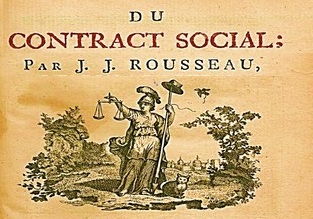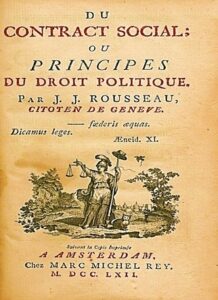The BEST: On the Social Contract

 Summary: Assimilating the insights of many of the early-modern natural law and social contract theorists, Jean-Jacques Rousseau’s On the Social Contract; or, Principles of Political Right (1762) is a landmark in political theory. Its account of the purpose and powers of government is both rigorous and impressively concise. Although at times technical and abstract, On the Social Contract is marked by a wonder at the human condition, especially at humanity’s evolutionary transformation from prehistoric, asocial animals, to civilized beings. In Discourse on the Origin of Inequality, Rousseau noted that humans hunger for socialization, and that this hunger manifests in the opposing poles of competition and collaboration. On the Social Contract picks up where the Discourse left off, with the question of how to balance our individual competitiveness with the dignity of a common life. Indeed, the social contract is precisely the answer to this question, as Rabbi Jonathan Sacks explains:
Summary: Assimilating the insights of many of the early-modern natural law and social contract theorists, Jean-Jacques Rousseau’s On the Social Contract; or, Principles of Political Right (1762) is a landmark in political theory. Its account of the purpose and powers of government is both rigorous and impressively concise. Although at times technical and abstract, On the Social Contract is marked by a wonder at the human condition, especially at humanity’s evolutionary transformation from prehistoric, asocial animals, to civilized beings. In Discourse on the Origin of Inequality, Rousseau noted that humans hunger for socialization, and that this hunger manifests in the opposing poles of competition and collaboration. On the Social Contract picks up where the Discourse left off, with the question of how to balance our individual competitiveness with the dignity of a common life. Indeed, the social contract is precisely the answer to this question, as Rabbi Jonathan Sacks explains:
When we move from the politics of “Me” to the politics of “Us,” we rediscover those life-transforming, counterintuitive truths: that a nation is strong when it cares for the weak, that it becomes rich when it cares for the poor, that it becomes invulnerable when it cares for the vulnerable (Morality, 20).
The origin of peoplehood, Rousseau argues, lies in the social contract: “Before examining the act by which a people chooses a king, it would be well to examine the act whereby a people is a people” (I:5). Contra Hobbes, Rousseau argues that a people does not form to avoid violence, for two main reasons. First, it is only the state of society that generates the motive for violence (I:4). If not for the competitiveness to which society drives us, humans would never come to blows, amid nature’s bounty (Discourse, 69). Second, even the purported fear of violence is not sufficient to moot humanity’s existential need for liberty, which Rousseau takes as essential to human dignity: “Free peoples regularly sacrifice… life itself to maintain their liberty…” (Discourse, 82-83).
As Rousseau has it, the social contract does not alienate the individual’s power of self-government, but preserves it in elevated form. Society forms not to avoid violence, but so that individuals can better meet the challenges of living through collaboration, innovation, and shared knowledge. It is this, almost libidinal, connection that joins individuals into a people, itself a sort of “invention” establishing them as a “single moving power, made to act in concert” for the common good (I:6). The common good, or the “general will,” is then the foundation for all legitimate lawmaking. Importantly, the community’s general will is not simply an expression of the will of the majority (I:3). It is, rather, what a disinterested person would recognize as the policy all community members should agree upon as being in their mutual interest.
The remainder of On the Social Contract examines the nature of government institutions. The power to implement laws is the essence of what Rousseau calls sovereignty. Rousseau takes this up in Book II: Every law flows from, and is validated by, the sovereign social contract, and is a further “agreement of the [political] body with each of its members” (II:4). However, the implementation of particular laws and institutions relies on executive power, which is not identical with the general will. In this function, the people must be represented, so that while “the people cannot be represented in the legislative power… it can and should be represented in the executive power, which is merely force applied to the law” (III:15).
The split between executive and legislative powers opens a conundrum: how will we ensure representatives remain loyal to the general will? For this, Rousseau highlights the judicial power: regular assemblies put the government “on trial,” as citizens vote on the continuance or discontinuance of the current government institutions and representatives (III:18; IV:2). Special judicial agencies also help keep the government within its legitimate powers and beholden to the general will.
Why this is The BEST: On the Social Contract is one of a few texts with a lasting impact on democracy, influencing the leaders of the French and American Revolutions, as well as the nineteenth- and twentieth-century independence movements in Europe and the Third World. It remains strikingly on point for our times. To take one example, recent protests involving property destruction raise the question of the ultimate role of the state. Is it to abolish violence and protect property, à la Hobbes, or is there something that precedes government institutions, including property, in the foundation of the political order? Rousseau’s provocative suggestion is that the common good can, at times, entail violating legal institutions, if the social contract itself is at stake.
As R. Sacks has written, in our fractured world, the very fabric of the social contract seems to be coming apart. Competitiveness rules the day, even as COVID-19 has revealed just how interdependent we all are. In these trying times, Rousseau’s On the Social Contract is a breath of fresh air, a reminder that if we lose our sense of “We,” our individual liberty, prosperity, and even our health, will soon follow.
Isaac Fried works in a wine shop, and received his B.A. in political science from Yeshiva University and his M.A. in philosophy from University College Dublin.
Click here to read about “The BEST” and to see the index of all columns in this series.
